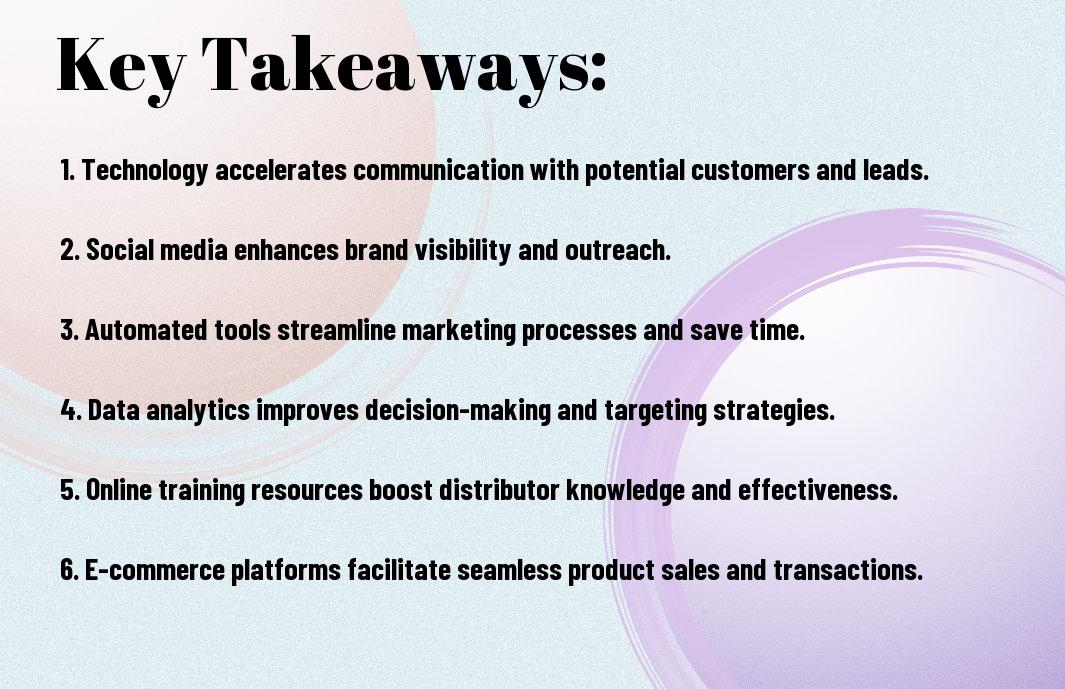Marketing in the digital age has transformed how you approach network marketing. Leveraging technology can significantly enhance your reach and efficiency, allowing you to connect with potential customers and recruits globally. By utilizing social media platforms, automation tools, and data analytics, you can streamline your efforts and maximize your results. However, it’s important to remain aware of the potential pitfalls associated with over-reliance on these tools. Embracing technology thoughtfully can empower your network marketing strategy to reach new heights.
Key Takeaways:
- Enhanced Communication: Technology facilitates instant communication with team members and customers, improving collaboration and engagement.
- Online Marketing Tools: Digital platforms and software enable efficient lead generation and marketing strategies, expanding reach and visibility.
- Training and Support: Virtual training sessions and resources allow for continuous learning and development, empowering distributors to succeed.

Understanding Network Marketing
The concept of network marketing revolves around building a sales network through personal relationships and promoting products or services directly to consumers. This business model thrives on referrals and personal connections, allowing you to leverage your network while compensating you for your efforts. As you engage with others, you create opportunities for growth, making network marketing a unique blend of salesmanship and social connection.
Definition and Principles
Between creating a strong personal network and leveraging it for business success, network marketing is about fostering relationships to drive sales. By recruiting others to join your network and helping them succeed, you can enhance your income through commissions and bonuses. The principles of trust, collaboration, and mentorship are central to this approach.
Evolution of Network Marketing
Around the mid-20th century, network marketing began to gain prominence as a viable business model. Initially, companies like Amway and Avon pioneered this approach, focusing on direct selling through a network of independent distributors. You may notice that over the years, it has evolved with changing consumer behavior and technological advancements, adapting to suit modern entrepreneurial needs.
Another significant shift in the evolution of network marketing is the emergence of social media and digital platforms. With the rise of the internet, businesses expanded their reach, allowing you to connect with a larger audience than ever before. However, this evolution has also brought challenges, such as increased competition and the risk of unscrupulous practices that may tarnish the industry’s reputation. On a positive note, the use of technology has empowered you to access training resources, share product information, and automate marketing efforts, ultimately enhancing your potential for success in network marketing.

The Impact of Technology
Any network marketer can attest to the profound impact technology has made on their business strategies. With the rise of various digital platforms, you can now reach a broader audience and manage your network more efficiently than ever before. Embracing these technological advancements allows you to streamline your operations, enhance communication, and ultimately drive growth.
Digital Communication Tools
Among the most significant changes in network marketing is the integration of advanced digital communication tools. These platforms enable you to maintain seamless connections with your team and customers, facilitating real-time collaboration and feedback. By utilizing tools like video conferencing and instant messaging, you can easily share updates, ideas, and support, reinforcing the sense of community within your network.
Social Media Strategies
Between direct interactions and shared content, social media strategies play a pivotal role in your marketing efforts. Engaging with your audience on platforms like Facebook, Instagram, and LinkedIn allows you to showcase your products, share testimonials, and foster relationships. Each post can elevate your brand and attract potential clients or partners, thus amplifying your reach.
In addition, incorporating effective social media strategies can significantly boost your visibility and engagement. By creating shareable content and leveraging targeted ads, you can attract a niche audience that resonates with your offerings. Don’t shy away from interacting with your followers, as building relationships is key to increasing trust. However, you should also be cautious; negative feedback or mismanagement of online persona can harm your reputation. Ultimately, a well-planned social media strategy can yield positive results and create a thriving network for you.
Automation in Network Marketing
Many entrepreneurs in network marketing are turning to automation to streamline their processes and enhance efficiency. By incorporating automated systems, you can focus on growing your business while technology handles repetitive tasks. Discover why technology is important in your direct selling business, allowing you to maximize your potential and improve productivity in your network marketing efforts.
Lead Generation Tools
Tools designed for lead generation are fundamental for expanding your customer base effectively. They help you identify and engage potential leads, automate outreach, and nurture relationships seamlessly. By employing these tools, you can focus your energy on closing deals while the technology handles the initial stages of lead management.
Customer Relationship Management (CRM) Systems
Against the backdrop of a competitive market, implementing CRM systems is imperative for managing your customer interactions and data efficiently. These systems facilitate the organization of customer information and enable tailored communication, which enhances your overall engagement strategy.
Consequently, CRM systems empower you to track and analyze customer relationships, leading to improved service and retention. By automating routine tasks, you can allocate more time toward building strong relationships with your clients, ultimately driving sales and growth. The insights garnered from these systems can also help you identify trends and opportunities, ensuring that you respond swiftly to changing market demands.
Data Analytics and Performance Measurement
Your approach to data analytics and performance measurement shapes the effectiveness of your network marketing strategy. By venturing into analytics, you can uncover insights that drive better decision-making. For more on the importance of technology in networking, check out Why Your Networking Technology Is Crucial To … . You’ll gain a clearer picture of how your initiatives are performing and identify areas for improvement.
Tracking Sales and Engagement
Engagement metrics are vital for understanding how your audience interacts with your products or services. By utilizing tracking tools, you can measure performance in real-time, revealing which strategies resonate with your prospects and clients.
Utilizing Data for Strategy Refinement
Against a backdrop of evolving market dynamics, the ability to refine your strategy based on data insights cannot be overstated. It’s necessary to closely analyze customer feedback, behavior, and market trends.
Refinement in your approach means harnessing the power of data analytics to pinpoint what works and what doesn’t. By converting raw data into actionable insights, you can identify key performance indicators that indicate success while recognizing patterns that may pose risks. This continuous cycle of analysis and adjustment helps you maintain a competitive edge and fosters sustainable growth, ensuring that your network marketing efforts align with the ever-changing demands of the market.
Building an Online Presence
Once again, establishing a strong online presence is important for your success in network marketing. With the right strategies, you can connect with potential customers and build meaningful relationships. This digital footprint allows you to showcase your brand, share valuable content, and engage with your audience effectively. By leveraging various online platforms, you can significantly expand your reach and influence within the network marketing landscape.
Personal Branding and Online Identity
Below, creating a consistent personal brand is vital to stand out in the competitive world of network marketing. Your online identity should reflect your values, expertise, and personality, making it easier for potential customers to relate to you. By sharing your journey and insights, you build trust and credibility, allowing others to see you as a leader and expert in your niche.
Leveraging Content Marketing
For effective content marketing, you need to produce high-quality, engaging content that resonates with your audience. This includes blog posts, videos, podcasts, or social media updates tailored to their interests and needs. By focusing on valuable content, you position yourself as a thought leader, making it easier for prospects to find and engage with you.
But, content marketing requires a strategic approach to be truly effective. You must focus on creating relevant and informative content that addresses the pain points of your audience while providing solutions. Moreover, be cautious not to overwhelm your audience with overly promotional material, as this could damage your reputation. Instead, aim for a balance of entertainment and education. By doing so, you’ll build a loyal community that trusts your expertise and is more inclined to engage with your offerings.

Overcoming Challenges with Technology
To thrive in network marketing, you must navigate various challenges posed by technology. By embracing digital tools and platforms, you can streamline communication, enhance marketing efforts, and build stronger connections with your team and customers. Staying adaptable and continuously learning will empower you to turn potential obstacles into opportunities, ultimately driving your success in this dynamic landscape.
Addressing Misconceptions
Misconceptions about technology in network marketing often lead to hesitation and missed opportunities. Many believe that technology complicates personal interactions, but in reality, it can enhance your ability to connect with others. Emphasizing the human element in marketing strategies allows you to leverage technology effectively without losing the personal touch necessary in this industry.
Cybersecurity and Data Privacy
Above all, protecting your network and customer data is paramount in maintaining trust and integrity. With increasing cyber threats, you should prioritize cybersecurity measures to safeguard sensitive information. Ensuring your systems comply with data privacy regulations not only secures your business but also enhances your credibility in the market, allowing you to forge stronger relationships with your clients.
With the rise in digital marketing, securing your network against cyber threats cannot be overlooked. You need to implement strong password protection, regularly update software, and educate your team about phishing scams and other threats. By instituting a culture of awareness around data privacy, you can effectively mitigate risks, reinforcing your reputation as a trustworthy network marketer. This proactive approach not only ensures the safety of your data but also enhances customer confidence in your brand.
Conclusion
Hence, as you navigate the landscape of network marketing, embracing technology can significantly enhance your strategies and outreach. By utilizing social media platforms, automation tools, and data analytics, you can streamline your efforts and connect with a broader audience. This technological integration not only boosts your efficiency but also empowers you to build stronger relationships with your team and customers. As you adapt and innovate, your network marketing success is bound to follow.
FAQ
Q: How has technology changed the way network marketing operates?
A: Technology has transformed network marketing by enabling instant communication and reaching a global audience. Social media platforms allow individuals to connect and share marketing messages efficiently. Automated marketing tools and customer relationship management (CRM) software help track leads and manage relationships, making it easier for marketers to increase their outreach and improve sales strategies.
Q: What types of technology can enhance network marketing efforts?
A: Several types of technology can enhance network marketing efforts, including social media platforms like Facebook, Instagram, and LinkedIn for outreach; email marketing tools for nurturing leads; video conferencing platforms for virtual meetings; and mobile apps for personal organization and tracking progress. Additionally, websites and blogs can serve as powerful tools to provide valuable content and attract potential clients.
Q: How can data analytics improve network marketing strategies?
A: Data analytics can greatly improve network marketing strategies by providing insights into customer behavior, preferences, and engagement patterns. By analyzing data from marketing campaigns, businesses can identify what works and what doesn’t, allowing them to refine their approaches. This informed decision-making can lead to more effective targeting, higher conversion rates, and ultimately, better overall performance in their marketing efforts.
Q: What role does social media play in network marketing?
A: Social media plays a pivotal role in network marketing as it facilitates direct interaction between marketers and potential customers. It allows for the sharing of testimonials, product information, and engaging content that can attract interest. Additionally, social platforms enable marketers to create communities around their products or services, fostering relationships and trust among customers and encouraging word-of-mouth marketing.
Q: How can automation tools benefit network marketers?
A: Automation tools benefit network marketers by streamlining repetitive tasks, such as sending out emails or managing social media posts. This allows marketers to focus more on developing relationships and strategies. By utilizing lead generation and nurturing tools, automated follow-ups can be scheduled, ensuring consistent engagement with potential clients without overwhelming the marketer. This not only saves time but also enhances productivity.


